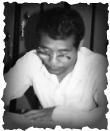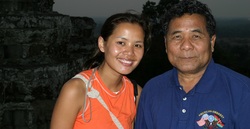| BANYAN BLOG |
banyan blog
"The roots of education are bitter, but the fruits is sweet"  Dad around 1981 Dad around 1981 My father was born in Takeo Province, Cambodia in 1940. I knew growing up that this was not his real birthdate. My understanding was that he changed his birthdate at the Thai Refugee Camp to be younger so that he could prolong his retirement in the U.S. It wasn’t until I started my first interview with him in 2003 that I found out he changed his age much earlier in life and for a more important reason...
2 Comments
Scene of an accident between a Lexus SUV and moto driver, Phnom Penh. Even with 20 years of driving experience I have not yet mustered the courage to drive a car or a moto in Phnom Penh. At it’s best, driving in the city is rather organic. Since everyone drives fairly slowly if you follow the wave of traffic and always watch what’s in front of you, you will likely make it home safely. At it’s worst, when every vehicle (car, tuk tuk, motos, and bicycles) is fighting for every inch forward during rush hour traffic, constantly weaving in and out, and often driving the opposite direction of one way streets, it becomes a bit overwhelming. Because there are so many drivers who don’t follow the traffic rules, and there is little enforcement of it, it is a frustrating and dangerous exercise of patience and luck.
“Times change and we change with them” Latin Proverb PHOTOS OF THE WEEK Last Sunday my four-year old son and I participated in the Amazingly Silly Tuk Tuk Race in Phnom Penh, sponsored by the British Chamber of Commerce at Gasolina Restaurant. Think of the popular American TV show the “Amazing Race” only this time the scavenger hunt consisted of contestants racing through the streets of Phnom Penh in a tuk tuk frantically searching for clues, solving riddles, and taking silly pictures in a tiger mask. The game was a fun way for us to discover the city in one of the most efficient and safer of transportation in Cambodia today.
A tuk-tuk is a three-wheeled carriage-like vehicle attached to a motodop (motor bikes). The vehicle is popular among tourists and locals alike. It is so prevealent throughout the country that tuk tuks could now be part of the cultural icons of Cambodia along with Angkor Wat, amok, and monks. Yet, I couldn’t help but wonder what life was like in Cambodia before tuk tuks? What happened to the cyclos I remember seeing in 2004 that peddled us around the city? "The living owe it to those who no longer can speak to tell their story for them.” Czestaw Mitosz, The Issa Valley PHOTOS OF THE WEEK  Phnom Bakheng Temple, Siem Reap, 2004. Phnom Bakheng Temple, Siem Reap, 2004. It was always my father’s dream to live in Cambodia in his old age. Sadly, he never had a chance to realize that dream as he passed away in July from complications of Para supra-nuclear palsy (PSP), a little known disease that resembles Parkinsons. A few months before he passed, my husband received a great offer to work at a non-governmental organization (NGO) in Cambodia. I remember that warm day in March when we broke the news to my parents that we were going to move. When we arrived at the house, my mother was pulling weeds out of the garden and my father was sitting in his wheelchair enjoying the fresh air. I got out of the car and told my mother that she needed to sit down on the bench because we had important news. I pushed my father's wheelchair next to her. As soon as the words escaped out of my mouth “we are moving to Cambodia” my mother immediately shot off the bench and gave us reasons not to go; the lack of quality education for the kids, crime, poverty, and political instability, were some of the reasons she cited. Even with the passage of time, she still feared that we could be trapped in Cambodia like during the Khmer Rouge regime. She couldn’t understand why we would want move to back to the country that tore her family apart. My father sat in his wheelchair and with a simple smile whispered, "I'm going too". He always saw the beauty of Cambodia despite the traumas of the past. Yesterday, October 12th, marked the 100th Day Anniversary of my father’s passing. In Cambodian culture, a Buddhist ceremony is held seven days, 100 days, and one year after a person’s death. These ceremonies help the living remember and honor the deceased and help the deceased to find peace and safe passage into the next life. It is also timely that a week earlier was Pchum Ben (All Souls Day or Festival of the Dead), a significant religious holiday in which Cambodians flock to the temples to make offerings to their ancestors to help them earn merit for the next life. To commemorate both occasions, I went to the temple in Phnom Penh and Takeo, my father's home province, to make offerings to the monks to pray for his soul. Everyday since I’ve been in Cambodia, I think about how bittersweet it is that I am here. With Pchum Ben and his 100 Day Ceremony, these last few days have been especially hard for me to accept that I am here without him. I look at the faces around me and it reminds me of his face, his smile, and his demeanor. I see how much Cambodia has changed since the last time I was with him in 2004 and I know he would be amazed too. And while I grieve of his loss, I also understand that everything in life has it’s own timing and purpose. This is the way God intended it to happen. The question then remains what is my purpose in being here, particularly at this point in my life? I realize that I have been given a precious gift to live out my father’s dream—to reconnect and rediscover a country he loved so dearly. The time that I spend here now has taken on more meaning. Through this journey of rediscovery, I hope to show you through captivating photos and interesting stories why Cambodia is a special place. From the daily struggles and triumphs that people face, to the dichotomy of Khmer identity and culture, and the beautiful and sometimes peculiar things that make Cambodia unique. This is the story my father always wanted to tell and every time I do, I do so in his remembrance. |
FEATURED INMOST POPULARThe Journey Archives
October 2022
follow |
© banyan blog 2013-2022
All Rights Reserved
All Rights Reserved


